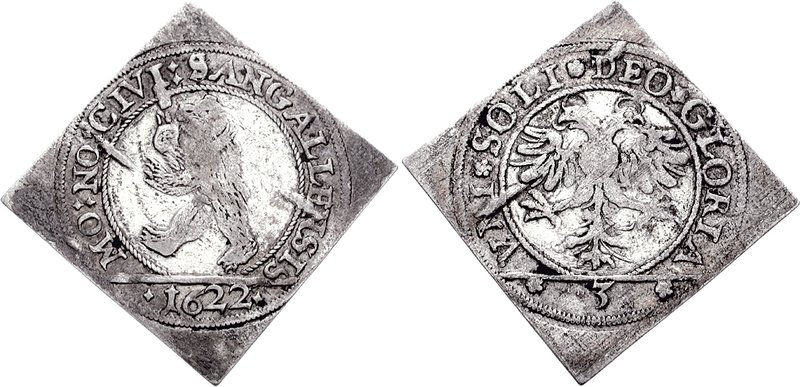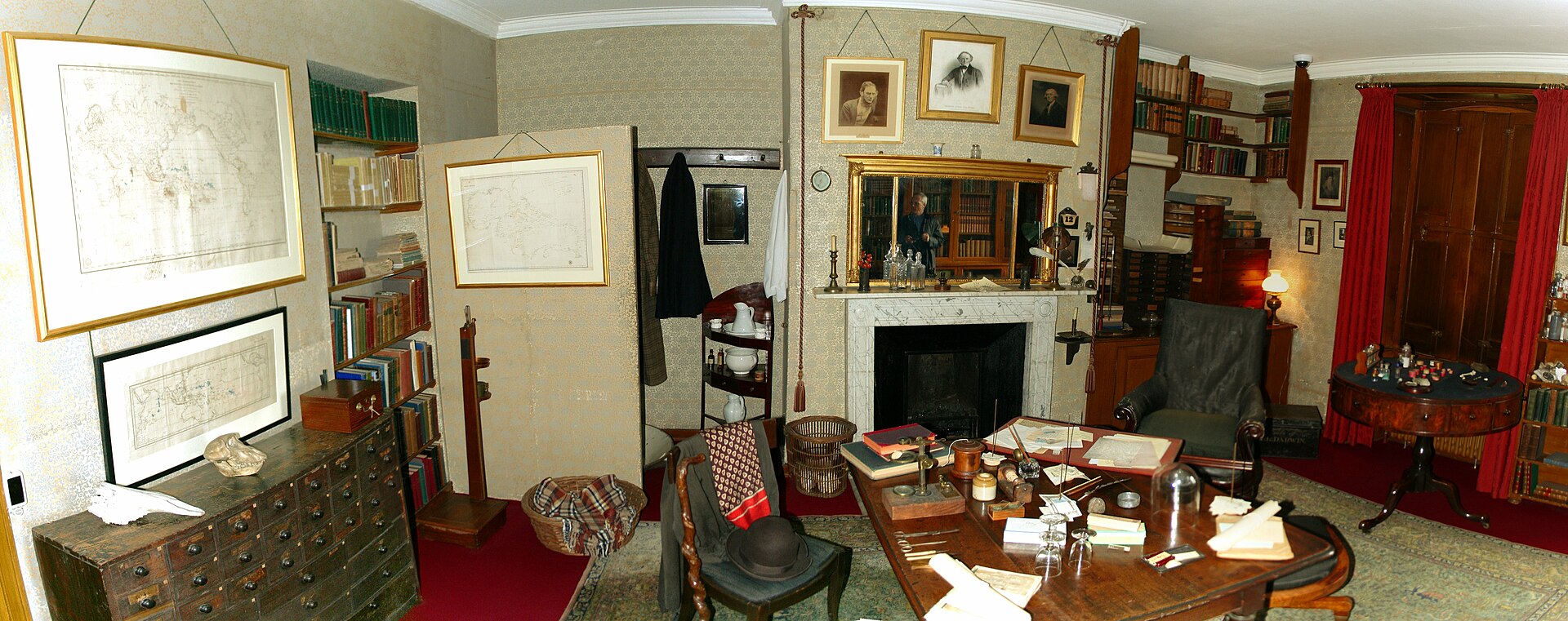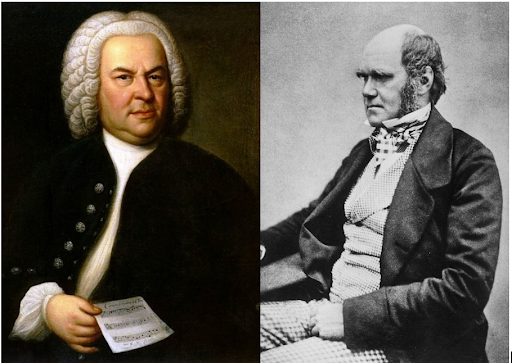Johann Sebastian Bach and Charles Darwin were two of the most creative minds of their time. Although they lived in different eras and worked in different fields, both left a lasting legacy for humanity. What inspired their creations? How did their motivations differ, and how did that influence their ultimate life satisfaction?
Source of inspiration
Bach was part of a large family of musicians. Born in the German town of Eisenach in 1685, he began his musical career as an organist in the city of Schweinfurt and later became director of the town musicians in the city of Erfurt.
Although all the Bachs had different personalities, they all had one thing in common: a uniformly high moral character and a sincerely pious heart.
Johann Sebastian Bach was a prime example of this quality. In his own words, “The aim and final end of all music should be none other than the glory of God and the refreshment of the soul.” He finished all of his manuscripts with the latin phrase Soli Deo Gloria which translates to “for the glory of God alone.”

Bach’s source of inspiration was of a spiritual nature. His talent, painstakingly refined over decades, had a clear purpose: showing gratitude to God and honoring His name.
Success
You are now signed up for our newsletter
Success
Check your email to complete sign up
Darwin’s life efforts were driven by another type of motivation: The desire to please his father. Born into a wealthy English family on February 12, 1809, Darwin lost his mother when he was only eight years old. His father, a reputed medical doctor, was quite strict and expected him to follow in his footsteps as a physician. Darwin, however, had little interest in that field and devoted himself to the natural sciences.
According to a study conducted by Dr. Gail Saltz, an associate professor of psychiatry at the New York Presbyterian Hospital Weill-Cornell School of Medicine, and David Kohn, founder and director of the Darwin Manuscripts Project at the American Museum of Natural History; Darwin harbored a strong desire to please his father for most of his life. This self-inflicted pressure was accompanied by constant anxiety that led to a nervous breakdown when his father died.
It is believed that his emotional state was reflected in his physical health. Before his five-year voyage on the HMS Beagle across the Atlantic Ocean, Darwin, then 22 years old, was already suffering from anxiety attacks, headaches and eczema-like skin irritations.

Facing hardship
When Darwin’s mother died, his older sisters became his maternal figures. According to Saltz and Kohn’s study, Darwin’s sisters were very critical of him. The researchers noted that his aversion to criticism, in addition to anxiety attacks, may have been the reason why Darwin held back in publishing his most notable work for nearly 21 years.
Darwin married his cousin, Emma Wedgwood, who was a devout Unitarian Christian. They had ten children, seven of whom survived to adulthood.
For much of his life, Darwin suffered from an uncommon combination of illness symptoms such as malaise, vertigo, dizziness, muscle spasms and tremors, vomiting, cramps, crying, anxiety, sensation of impending death and loss of consciousness, fainting, insomnia and depression. The latter was particularly severe after hitting a wall in his research into his 50s.
In a letter to a close friend, he explained, “I have not the heart or strength at my age to begin any investigation lasting years, which is the only thing which I enjoy.” In the same letter to his friend, he wrote, “I have no little jobs which I can do — So I must look forward to Down grave-yard, as the sweetest place on this earth.”

Bach also suffered numerous losses throughout his life. His mother died in 1696 when he was only 10 years old, and his father passed away eight months later. The young Bach went to live with his older brother Johann Christoph Bach, who taught him to play the clavichord and exposed him to the works of the great composers of the time.
As an adult, Bach married his cousin, Maria Barbara Bach. Together they had seven children, but only four lived to adulthood. Maria Barbara died suddenly after thirteen years of marriage while he was away, and was buried before he could say goodbye. Seventeen months later, Bach married Ana Magdalena Wilcke, a prolific soprano. Although she gave birth to thirteen children, only six survived, whom she devotedly raised along with her stepchildren.
Although Bach suffered such hardships, there is no record that personal tragedies affected his work. On the contrary, it is believed that the bitter experiences gave rise to the deeply moving melodies he composed.
When he reached his later years, Bach dedicated his life to imparting his skills to others. As a teacher, he was instructive and clear, and in artistic projects he often had a group of pupils following in his footsteps, hoping to learn from the great self-taught composer.
Spiritual views
Bach believed that talents are bestowed upon humans by the Divine. He was a devout Lutheran who dedicated about three-quarters of his musical work to the church. In his compositions, produced through dedicated craftsmanship, Bach sought to capture the beauty of his faith.
Bach’s piety, personality and artistry – deeply rooted in the old Lutheran church – stood out even in his own time. His mission was to uphold the traditions and safeguard the heritage from which his contemporaries were trying to break away. Perhaps that is why the composer’s music, deeply admired and acclaimed today, was rejected in his time.
Bach died on July 28, 1750 from complications due to an unsuccessful eye surgery. On his deathbed, Bach said to his wife, “Don’t cry for me, for I go where music is born.”
As for Darwin, he had a strong spiritual belief as a young man, and originally aimed to be a clergyman. He attended Cambridge University to earn a degree in philosophy and letters, but soon discovered his passion for natural history. He changed his focus to natural theology, that is, the study of the divine design of nature and the workings of God through the laws of nature.
As he advanced in his scientific studies, Darwin became more and more doubtful of man’s divine origin. At the end of his life, Darwin described himself as an agnostic. In a letter to Frederick McDermott he stated, “I am sorry to have to inform you that I do not believe in the Bible as a divine revelation, & therefore not in Jesus Christ as the Son of God.”

On his deathbed, he told Emma that he had not the slightest fear of death, although the existence of the afterlife and the idea of salvation was not something he believed in. He died at Down House on April 19, 1882, leaving behind an evolutionary theory that cut the ties between humankind and the Divine – Bach’s very source of inspiration.
Life satisfaction
Darwin married his cousin, Emma Wedgwood, who was a devout Unitarian Christian. After their marriage, they shared discussions about Christianity for several years, during which Emma became increasingly concerned that Darwin’s incipient disbelief would develop tensions between the two. Despite Darwin’s changes in faith, Emma remained steadfast in hers.
Although he had married and raised a family of his own free will, Darwin regretted not being able to devote himself entirely to work. In a letter he wrote to a friend who was about to marry, he said, “I hope that your marriage will not make you idle: happiness, I fear, is not good for work.”
In another letter to his friend Asa Gray, he wrote: “My wife takes me on Friday as an abject prisoner to London for a month & I do hate stopping work — I am just like the retired tallow-chandler.”
Compared with Darwin, little is known of Bach’s family life except that he lived happily during his first marriage, and that his shared interest in music with his second wife, Ana Magdalena, brought joy to their home. Both strove to nurture the musical talents of their children, from whom were born celebrated musicians and composers who lived up to their family name.

Among the differences between Darwin and Batch, their outlook on life and their state of mind during their later years is noteworthy. Darwin’s theory of evolution regarded life as an accident, a product of chance. Bach’s faith made human life a special creation of God, a priceless miracle. Naturally, the way they dealt with loss and death itself differed greatly.
Motivation and inspiration are inherent components of any human endeavor, whether artistic or scientific. Regardless of spiritual affiliation, it is difficult to deny that harboring a higher purpose within, not only makes life worthwhile, but also brings a sense of fulfillment that can hardly be found in earthly pursuits.
READ ALSO:













